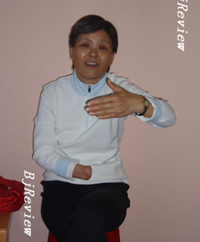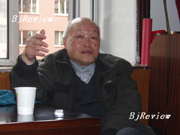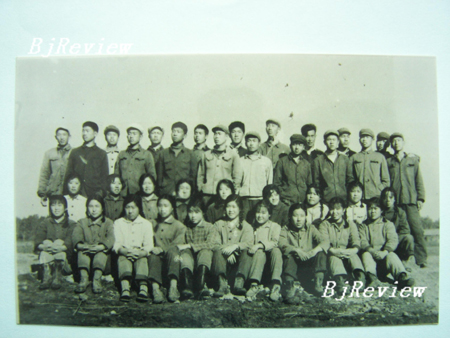| Home / China / Features | Tools: Save | Print | E-mail | Most Read |
| Volunteers in a Wild Land |
| Adjust font size: |
By Feng Jianhua In the 1950s and 1960s, answering the call of duty, tens of thousands of urban youth flocked to a wilderness in northeast China called Beidahuang. They were carrying out what they saw as their duty, to make this deserted area into "China's grain barn" in order to solve food shortages at the time. Large numbers of these urban youths were forced to drop out of school due to the disastrous Cultural Revolution (1966-76). They mostly came from six regions and numbered around 450,000. These young volunteers spent their adolescence opening up a wasteland and earned them the name Zhiqing, literally meaning young intellectuals. They made an unforgettable contribution to China's history and toward helping their fellow citizens. Labor models
"I feel I'm like a soldier," said Qu, proudly as she put on a yellow military-type coat. But her dream was soon snuffed out when she arrived at her destination: an old farm, with shabby houses, poor accommodation, no heating, and wind pouring in through the cracks in the wall. The volunteers' youthful enthusiasm was tainted by frustration as they had never lived without the shelter of their parents and had never found themselves engaged in hard labor building a dam. The following year, Qu's fate changed as a result of an accident, when she lost her right hand to a mower at work. She was the 14th volunteer to be hurt during work, but not the worst injured: someone else had lost a whole arm. Qu thought more about her future than the wound. The day after surgery she was back at work, and she soon began to train herself to write with her left hand. The story of Qu's struggle with misfortune began to spread and she became a famous model worker. On the National Day of 1969, Qu was invited to Beijing to mount the Tiananmen Rostrum and see Chairman Mao. Back from her Beijing trip Qu became even more busy than usual giving lectures about her exciting experience of seeing the country's greatest leader. Her change of fortune did not end there. In 1971, Qu became a member of the Heilongjiang Provincial Party Committee, at the age of less than 20. "I was like a big star at that time," she recalled, but Qu remained calm despite the recognition. "I haven't made that much contribution," said Qu, adding that she was just the right person chosen as an object of propaganda at the time. In 1972, the colleges reopened their gates to these young people. Qu was enrolled in Heilongjiang University and majored in philosophy. The philosophy department was coined the "cadre department" as most of the students there were young Party cadres like Qu. "To be honest, I failed to learn things at the college. I can't even tutor my grandson's middle school lessons now," Qu said, also confessing that she often missed classes as she was so occupied with frequent political meetings. Qu returned to the place she had once worked and became vice president of a local agricultural technical school. Later she married another Zhiqing and had a baby the next year, before returning to Harbin to live with her husband. After her retirement in 2006, Qu devoted her time taking care of her parents. The only exercise the energetic Qu has time to do now is swimming, by which she hopes to stop her wounded arm from withering. History record
Born in Shanghai in 1949, Zheng entered the Chinese Department of the reputed Fudan University at 21. The next winter he joined the army. In 1958, in response to a call for troops to exploit virgin land in border areas, Zheng began his half-century bond with the great wild land. Exploring the virgin soil, Zheng did all kinds of work including rock quarrying, road repairing, lumbering and house building. He was wounded badly during an underwater mission and began contributing articles about his life in the wild land to a magazine during his recovery time. At his most difficult times during his first 20 years in the wild land Zheng was often starving, he recalled. In 1983, he joined a team that was compiling history records of Beidahuang and spent 10 years finishing the country's first comprehensive documentary book on the area's history. "I can't remember how many people I've interviewed and how many forgotten files I've found and read through," said Zheng. "Life is much better there now. Now Beidahuang is part of history, a history that we should not forget," he added. Zheng said he has left the most valuable memories there and writing the book is the most important part of his life. Unfading memory
At that time everybody put the nation before themselves, said Chang, but now college students are unwilling to answer the country's call for young people to go west and make their contributions, an attitude that he does not quite understand. In 1993, Chang and other co-workers at the farm formed a club for the many Zhiqing. On May 1, 2007, ten Zhiqing got together to remember the old days on the farm. "We couldn't imagine how we got through those tough days," noted Chang. Now the club has 513 members, many of whom hold important government positions and are the backbone of various industries. Tang Jian, a co-founder of the club, spent much energy and time in organizing the club. "I think the club means something to the Zhiqing group," Tang noted. "Without our parents around, in that difficult situation and environment, we had to help each other and the bonds cultivated through mutual support are something too valuable to be forgotten," noted 61-year-old Li Sumei, the person in charge of the club. "Zhiqing are a special group of people who are still making contributions to our country in the present. There needs to be an organization to pay attention to them and help them," said Li. Most Zhiqing are now approaching old age and have plenty of time to mull over their memories of the past, and the club is a good place for them to do it together, Li added.
Good old days: Chang Chao (4th from right in the back row) and his comrades on the farm (Beijing Review June 29, 2007) |
| Tools: Save | Print | E-mail | Most Read |
 |
| Related Stories |



